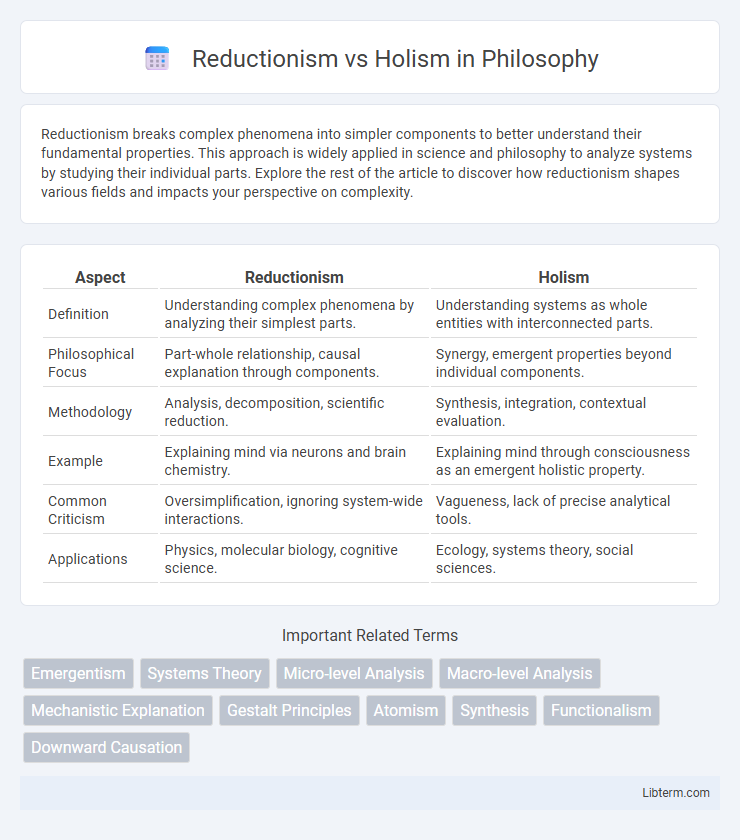Reductionism breaks complex phenomena into simpler components to better understand their fundamental properties. This approach is widely applied in science and philosophy to analyze systems by studying their individual parts. Explore the rest of the article to discover how reductionism shapes various fields and impacts your perspective on complexity.
Table of Comparison
| Aspect | Reductionism | Holism |
|---|---|---|
| Definition | Understanding complex phenomena by analyzing their simplest parts. | Understanding systems as whole entities with interconnected parts. |
| Philosophical Focus | Part-whole relationship, causal explanation through components. | Synergy, emergent properties beyond individual components. |
| Methodology | Analysis, decomposition, scientific reduction. | Synthesis, integration, contextual evaluation. |
| Example | Explaining mind via neurons and brain chemistry. | Explaining mind through consciousness as an emergent holistic property. |
| Common Criticism | Oversimplification, ignoring system-wide interactions. | Vagueness, lack of precise analytical tools. |
| Applications | Physics, molecular biology, cognitive science. | Ecology, systems theory, social sciences. |
Introduction to Reductionism and Holism
Reductionism breaks complex systems into simpler components to understand their basic functions, emphasizing analysis at the micro-level in fields like biology, psychology, and physics. Holism, in contrast, asserts that systems must be studied as integrated wholes, where emergent properties arise that cannot be understood solely by analyzing parts. Both approaches shape scientific inquiry and influence methodologies across disciplines by prioritizing different levels of explanation and interaction.
Historical Background of the Debate
The historical debate between reductionism and holism traces back to Ancient Greek philosophy, where thinkers like Democritus emphasized atomistic explanations, while Aristotle argued for understanding systems as wholes. During the Scientific Revolution, reductionism gained prominence with the success of Newtonian mechanics in explaining natural phenomena by breaking them into fundamental parts. The 20th century saw a resurgence of holism in disciplines like ecology and systems theory, challenging reductionist approaches by highlighting the complexity and interdependence of entire systems.
Core Principles of Reductionism
Reductionism centers on breaking complex systems into simpler components to understand their structure and function, emphasizing analysis, causality, and empirical observation. It assumes that the properties of a whole system can be fully explained by its individual parts and their interactions. Core principles include methodological atomism, causal determinism, and scientific reduction, striving for precise explanations through measurable units.
Essential Concepts of Holism
Holism emphasizes the understanding of systems as integrated and interconnected wholes, where the properties of the whole cannot be fully explained by analyzing individual components alone. Essential concepts of holism include synergy, emergence, and context-dependency, highlighting how interactions between parts produce new characteristics and behaviors. This perspective is fundamental in fields such as ecology, psychology, and systems theory, where the complexity and interdependence of elements drive overall system functionality.
Comparative Analysis: Strengths and Weaknesses
Reductionism excels in simplifying complex systems by breaking them down into fundamental components, enabling precise scientific analysis and control. Holism offers a comprehensive perspective by emphasizing the interconnectedness and emergent properties of systems, which reductionism may overlook. However, reductionism risks ignoring system-wide dynamics, while holism may suffer from vague definitions and challenges in empirical testing.
Applications in Science and Psychology
Reductionism in science and psychology breaks complex phenomena into simpler components for detailed analysis, enabling precise experimentation and targeted interventions such as in pharmacology and cognitive-behavioral therapy. Holism emphasizes the integration of parts within the entire system, promoting approaches like systems biology and humanistic psychology that consider context, relationships, and emergent properties. Both frameworks contribute to a comprehensive understanding of biological processes and mental health by balancing detailed mechanisms with interconnected complexity.
Case Studies Demonstrating Both Approaches
Case studies in medicine illustrate reductionism by isolating genetic mutations to understand specific diseases, such as identifying BRCA1 and BRCA2 genes in breast cancer research. In contrast, holistic approaches in environmental science emphasize ecosystem interdependencies, exemplified by Amazon rainforest studies that examine climate impact, biodiversity, and human activities collectively. Both methodologies offer valuable insights: reductionism provides detailed mechanisms, while holism addresses complex system-wide interactions.
Criticisms and Controversies
Reductionism faces criticism for oversimplifying complex systems by ignoring emergent properties that arise from interactions within the whole, often resulting in incomplete explanations. Holism is challenged for its lack of precise methodology and difficulties in empirical testing, leading to accusations of vagueness and sometimes untestable claims. The controversy centers on balancing detailed component analysis with understanding system-wide dynamics, highlighting the struggle between explanatory depth and integrative breadth in scientific inquiry.
Integration and Middle Ground Perspectives
Reductionism breaks complex systems into simpler components to understand their behavior, while holism emphasizes the interdependence and integration of parts within the whole system. Middle ground perspectives advocate combining both approaches, recognizing that analyzing individual elements alongside their interactions provides a more comprehensive understanding of complex phenomena. This integrative framework improves problem-solving in fields like biology, psychology, and systems theory by capturing both detailed mechanisms and emergent properties.
Future Directions and Implications
Future directions in the debate between reductionism and holism emphasize integrative methodologies combining systems biology and computational modeling to address complex phenomena in medicine and ecology. Advances in artificial intelligence and network theory support holistic perspectives by analyzing interdependent components within larger systems, enhancing predictive capabilities and intervention strategies. These developments imply a paradigm shift towards multidimensional approaches that balance micro-level details with macro-level interactions, fostering innovative solutions for global challenges.
Reductionism Infographic

 libterm.com
libterm.com